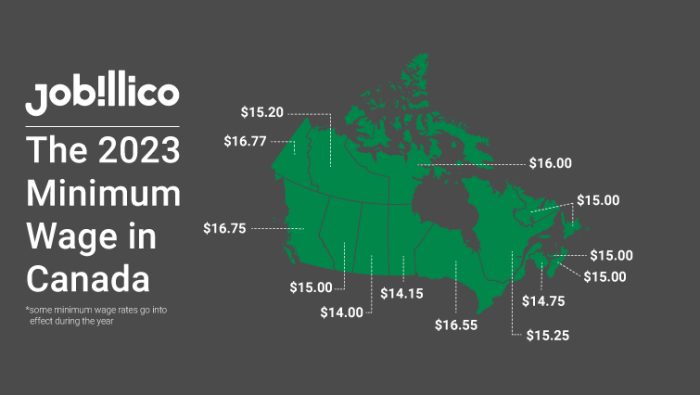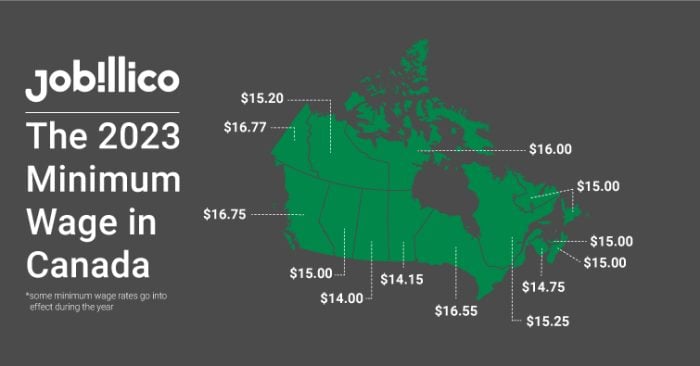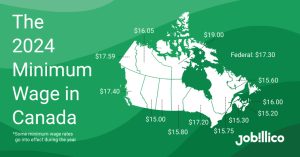The 2023 Minimum Wage In Canada
 Publié le 14 April 2023
Publié le 14 April 2023
The 2023 minimum wage in Canada is difference in every province and territory. With increases set to go into effect throughout the year, job seekers should know about the legal requirements for pay in their province.
The minimum wage is the lowest amount of pay that employers can offer their employees under the law. The 2023 minimum wage in Canada varies in each province and territory, and the Federal Government sets a separate minimum wage for its own employees. Due to provincial legislation, increases to the minimum wage can occur at different points throughout the year. As job seekers and employees grapple with the rising Consumer Price Index and the aftereffects of increased inflation, it’s important that they remain fully aware of these 2023 minimum wage increases.
A Brief History of the Minimum Wage in Canada
The first province to mandate a minimum wage in Canada was Manitoba, where it became law in 1918. Within two years, five additional provinces had created a minimum wage, including British Columbia and Nova Scotia. The final province to establish a minimum wage was Prince Edward Island, doing so in 1960. These early minimum wage laws did not apply to every job role in the province. Additionally, many also established different minimum wages based on the gender of employees — a practice only fully abolished in 1974.
What Is the Consumer Price Index?
According to the definition from Statistics Canada, the Consumer Price Index (CPI) “represents changes in prices as experienced by Canadian consumers. It measures price change by comparing, through time, the cost of a fixed basket of goods and services.” Multiple provinces in Canada link their minimum wage rates to the Consumer Price Index. In theory, this results in a minimum wage which more accurately reflects the true cost of living and housing. Inflation in Canada has recently reached the highest rates in 40 years. Though inflation is predicted to decrease in 2023, workers across the country will still feel the impact of these rates.
What Is The Alternative Minimum Wage?
There are certain provinces which have multiple minimum wages that are applied to different industries and job types, meaning that the average minimum wage in Canada in 2023 is affected by both location and the type of job.
These alternative minimum wages allow people working in certain job types – commonly roles where they can receive tips such as liquor and food servers and bartenders – to be paid a rate below the standard minimum. The justification is that they can earn additional gratuities (tips). British Columbia eliminated their alternative minimum wage in 2021, and Ontario followed suit in 2022. Quebec still has an alternative minimum wage for servers, and Alberta allows a lower minimum wage for students under 18.
The 2023 Minimum Wage in Canada – Per Hour by Province
- British Columbia: $16.75
- Alberta: $15.00
- Saskatchewan: $14.00
- Manitoba: $15.30
- Ontario: $16.55
- Quebec: $15.25
- New Brunswick: $14.75
- Nova Scotia: $15.00
- Prince Edward Island: $15.00
- Newfoundland and Labrador: $15.00
- Yukon: $16.77
- Northwest Territories: $15.20
- Nunavut: $16.00
- Federal: $16.65

British Columbia – $16.75 per hour
The 2023 minimum wage in British Columbia is $16.75 per hour, effective June 1st, 2023. This is a $1.10 raise, and a 6.9% increase of the minimum wage from $15.65 per hour in 2022. British Columbia will become the third province or territory in Canada to offer a minimum wage of $16.00 or higher. The provincial government has stated that they are committed to linking the provincial minimum wage to the inflation rate. This increase reflects the inflation rate in the previous year.
Alberta – $15.00 per hour
The 2023 minimum wage in Alberta is $15.00 per hour. This rate has remained unchanged since 2018, when Alberta became the first province in the country to create a $15.00 minimum wage. Alberta also maintains the alternative minimum wage of $13.00 per hour for students under the age of 18. Certain job roles are exempt from minimum wage standards in the province, such as real estate brokers, certain salespersons, non-profit counsellors and certain additional roles.
Saskatchewan – $14.00 per hour
The 2023 minimum wage in Saskatchewan is $14.00 per hour, effective on October 1st, 2023. This is a raise of $1.00 and a 7.4% increase over the previous rate of $13.00 in 2022. The province does not have an official alternative minimum wage in Saskatchewan, but certain jobs can be paid below this rate, including farm and ranch labourers, certain care providers, babysitters, and more. Saskatchewan links its minimum wage to the CPI from the previous year, with changes scheduled to take effect in October. The provincial government has announced additional plans to raise the minimum wage to $15.00 per hour in October 2024.
Manitoba – $15.30 per hour
The 2023 minimum wage in Manitoba is $15.30 per hour, effective into effect on October 1st. This is the second raise to the Manitoba minimum wage this years, after the previous increase to $14.15 in April. This is a $1.80 increase and a 12.5% rase in the span of 12 months from October 2022. There is no alternative minimum wage, but certain job roles are exempt from minimum wage requirements, including domestic workers who work under 12 hours per week and people in an approved provincial or federal training program.
Ontario – $16.55 per hour
The 2023 minimum wage in Ontario is $15.50 per hour. This rate will come into effect on October 1st, 2023, and increase the minimum wage by 6.5% from $15.50 per hour, which has been in effect since October 2022. The alternative minimum wage for liquor servers was also eliminated in Ontario in 2022, so the new rate applies to all workers over the age of 18 in the province. The only exception is for students under 18 working less than 28 hours per week or during school breaks, who can be paid the increased alternative minimum wage of $15.60.
Quebec – $15.25 per hour
The 2023 minimum wage in Quebec is $15.25 per hour, effective May 1st, 2023. This is a 7% increase and a $1.00 raise from the 2022 minimum wage in Quebec of $14.25 per hour. The 2023 alternative minimum wage in Quebec for workers who receive tips will also rise to $12.20, an increase of $0.80. The government argues that this increase is the largest in over 25 years and will benefit over 298,000 workers in the provinces.
New Brunswick – $14.75 per hour
The 2023 minimum wage in New Brunswick is $14.75 per hour, effective on April 1st, 2023. This comes after the minimum wage was raised twice in the previous year, first to $12.75 and then #13.75 per hour. In two years, the provincial minimum wage has been increased by $3. This is partially due to the New Brunswick linking their minimum wage to the CPI. Before this change was implemented, they offered the lowered minimum rage in the Maritime provinces.
Nova Scotia – $15.00 per hour
The 2023 minimum wage in Nova Scotia will rise twice, to $14.50 on April 1st and then to $15.00 per hour on October 1st, 2023. This is an acceleration of the previously announced goal to implement a $15.00 minimum wage in 2024. This will raise the minimum wage $1.40 from $13.60 in 2022, a 2.7% increase.
Prince Edward Island – $15.00 per hour
The 2023 minimum wage in Prince Edward Island will rise twice, first to $14.50 on January 1st and then to $15.00 per hour on October 1st, 2023. In one year, the minimum wage in PEI will rise $1.30 from the rate of $13.70 per hour in 2022, a 9.1% increase. This comes is a result of PEI linking their minimum wage in the CPI.
Newfoundland and Labrador – $15.00 per hour
The 2023 minimum wage in Newfoundland and Labrador will increase twice. First to $14.50 per hour on April 1st, then $15.00 per hour effective October 1st. This a total raise of $1.80 from the rate of $13.20 in 2022, an increase of 12.8%. Like Nova Scotia, this is acceleration of the previously announced goal to implement a $15.00 minimum wage by April 2024
Yukon – $16.77 per hour
The 2023 minimum wage in the Yukon is $16.77 per hour, and came into effect on April 1st. It is a raise of $1.07 from the 2022 rate, an increase of 6.7%. This minimum wage increase is calculated using the CPI. This is the highest minimum wage offered anywhere in Canada.
Northwest Territories – $15.20 per hour
The 2023 minimum wage in the Northwest Territories is $15.20 per hour. The last increase to the territorial minimum wage came into effect in September 2021. As announced by the territorial government, starting in September 2023 minimum wage in the Northwest Territories will be linked to the consumer price index. This means that additional raises will likely happen soon, but no official dates or rates have been officially announced.
Nunavut – $16.00 per hour
The 2023 minimum wage in Nunavut remains $16.00 per hour. This raise came into effect in April 2020, and at the time it was highest hourly minimum wage of any province or territory in Canada. Given the high costs of living in Nunavut, plans to review the minimum wage were announced in 2022 but no additional raises have been confirmed at this point.
Federal – $16.65 per hour
The 2023 minimum wage for job roles in the Canadian Federal Government is $16.65 per hour effective April 1st, 2023. This is a $1.10 raise and a 6.8% increase over the 2022 federal minimum wage of $15.55 per hour. People employed by the Federal Government will earn this rate regardless of which province or territory in which they work. This means that that a Federal employee working in Quebec will still earn $16.65 per hour, even though the 2023 minimum wage in Quebec is $15.25 per hour.
The 2023 minimum wage in Canada changes in each province and territory. There are increases in minimum wage rates scheduled to take effect throughout the year in most Canadian provinces and territories. Job seekers should remain aware of minimum wage increases in their jurisdiction, as it will ensure that employers remain compliant with their legal requirements for compensation.







